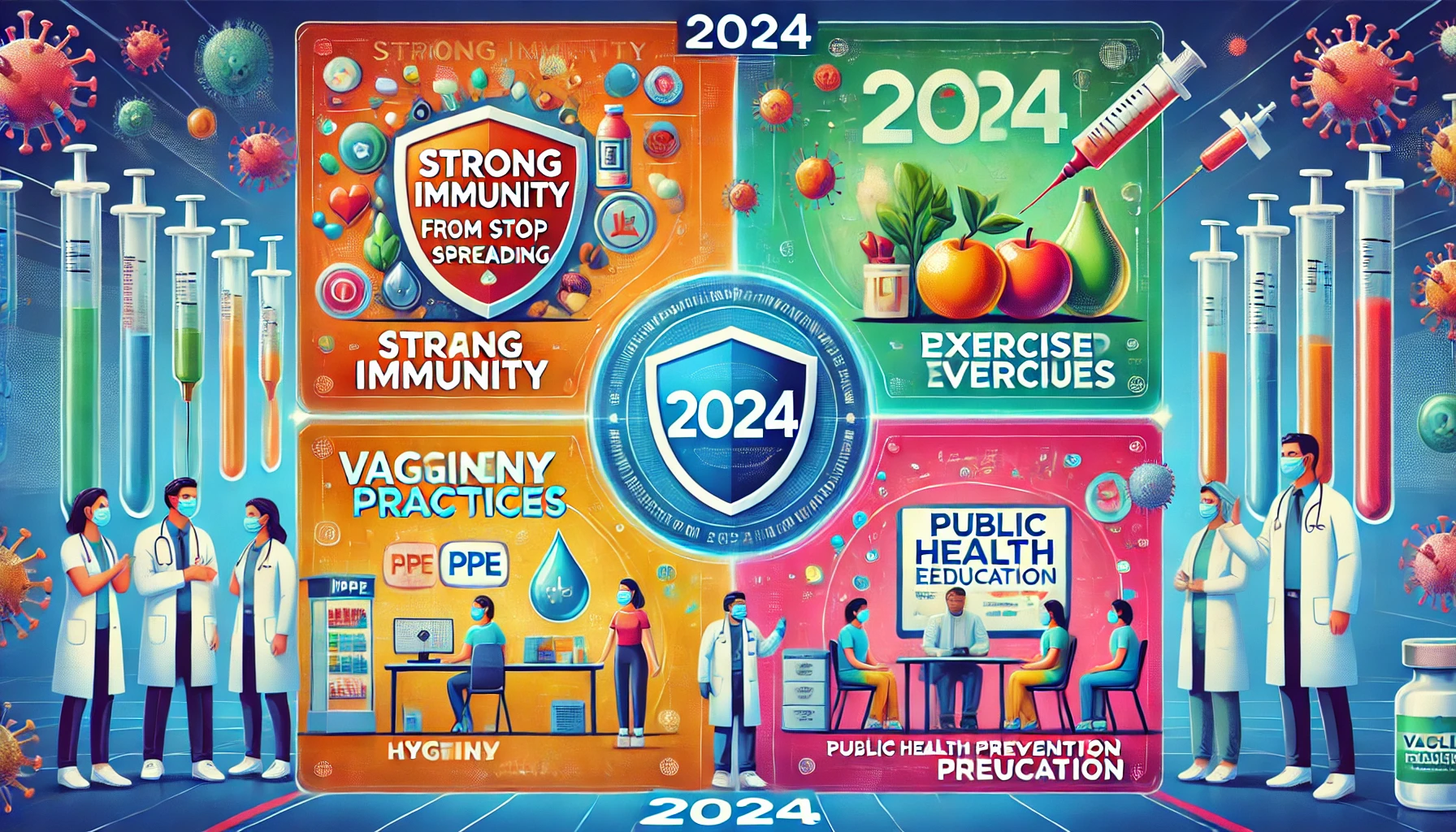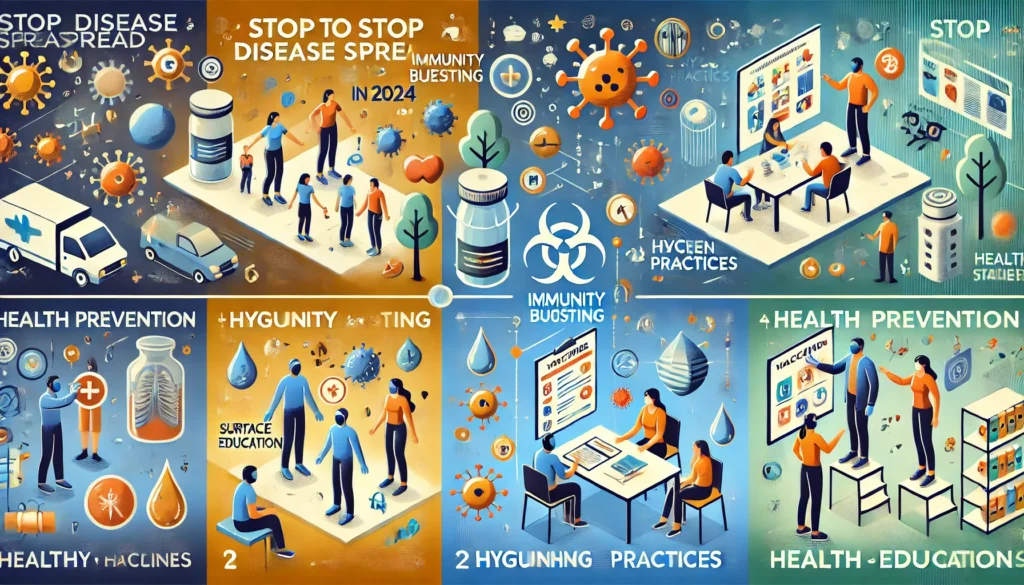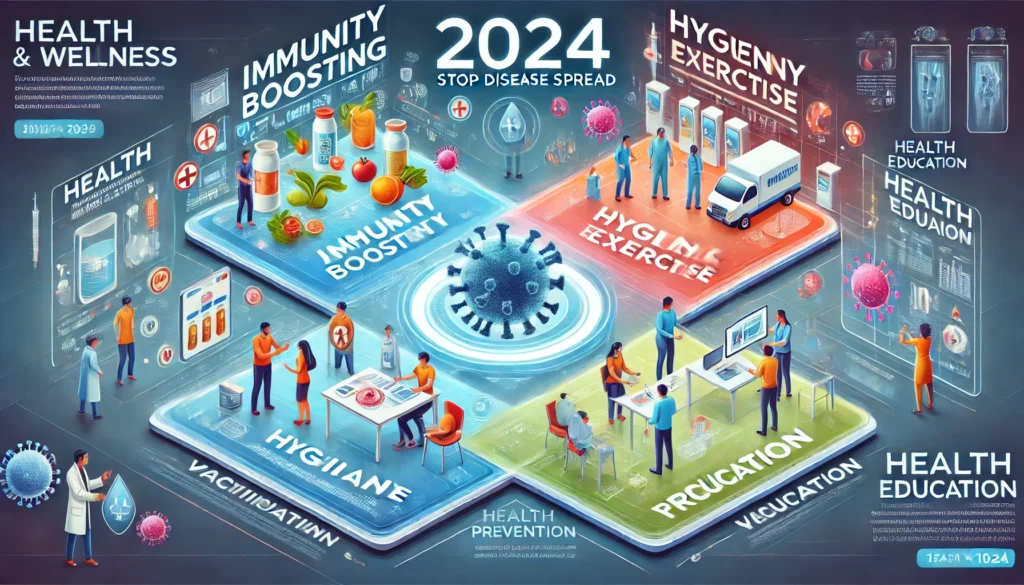
In an era where global health concerns are at an all-time high, finding effective strategies to stop disease is more critical than ever. From viral outbreaks to the resurgence of once-rare conditions, understanding how to prevent and control disease spread is essential for individuals, families, and communities alike. Let’s dive into four proven strategies to stop disease, helping us build healthier lives and more resilient societies in 2024.
Table of Contents
1. Strengthen Immunity Through Lifestyle Choices 💪
One of the most fundamental strategies to stop disease begins with bolstering our body’s natural defenses. A strong immune system is our body’s first line of defense against pathogens, reducing our risk of infection and mitigating the severity of diseases.
Key Actions to Enhance Immunity:
- Balanced Diet: Include nutrient-rich foods like leafy greens, berries, nuts, and lean proteins. These foods are high in antioxidants, vitamins (such as C and D), and minerals, which are essential for a healthy immune response.
- Regular Exercise: Moderate exercise, such as walking or cycling, can boost immunity by improving circulation, reducing stress, and strengthening the body’s natural defenses.
- Adequate Sleep: Quality sleep is crucial for immune function. Studies show that people who don’t get enough sleep are more likely to get sick after exposure to viruses like the common cold.
“Health is not just about what you’re eating. It’s also about what you’re thinking and saying.”
Supplemental Support: Vitamin D, zinc, and probiotics are some of the most commonly recommended supplements for immune health. It’s always best to consult a healthcare professional before adding supplements to your routine.

2. Promote Hygiene and Sanitation Practices 🧴
Effective hygiene practices are simple yet powerful strategies to stop disease in its tracks. Proper sanitation and hygiene can prevent the transmission of infectious agents in day-to-day life and help control potential outbreaks in communities.
Core Hygiene Practices:
- Handwashing: The CDC emphasizes the importance of washing hands with soap and water for at least 20 seconds. This simple act can eliminate harmful pathogens and is especially crucial before eating, after using the restroom, or when returning home.
- Surface Disinfection: Regularly disinfecting surfaces, particularly in high-touch areas like doorknobs, light switches, and mobile devices, reduces the chance of contamination and spread.
- Personal Protective Equipment (PPE): Masks and gloves are effective in limiting the spread of respiratory diseases and are particularly useful in crowded or enclosed spaces.
“An ounce of prevention is worth a pound of cure.”
Community-Level Hygiene: Beyond individual habits, community sanitation practices, such as clean water supply and public sanitation facilities, play an equally vital role in disease prevention. These measures reduce the risk of waterborne diseases and support healthier living conditions.
Hygiene and Sanitation Practices 🧴
| Practice | Purpose |
|---|---|
| Handwashing ✋ | Removes germs and reduces infection risk |
| Surface Disinfection 🧼 | Lowers contamination on frequently-touched surfaces |
| Use of PPE 😷 | Limits airborne and contact-based transmission in crowded spaces |
3. Encourage Regular Health Screenings and Vaccinations 💉
One of the most impactful strategies to stop disease spread involves proactive health management, which includes regular screenings and vaccinations. This not only helps in early disease detection but also in preventing the spread of highly contagious diseases.
Benefits of Regular Health Screenings:
- Early Detection of Illnesses: Screenings can detect diseases in their early stages, allowing for timely intervention and reducing the risk of further complications.
- Chronic Disease Management: Routine check-ups help identify risk factors for chronic conditions like diabetes, heart disease, and cancer, empowering individuals to make lifestyle adjustments.
- Increased Public Health Awareness: Screenings also provide an opportunity for healthcare providers to educate patients on disease prevention and healthy practices.
“Vaccination is an act of love and responsibility for oneself and others.”
Vaccinations: Immunizations remain a cornerstone in disease prevention, particularly for diseases like influenza, measles, and COVID-19. Vaccines stimulate the immune system, providing protection without causing illness, and are a crucial barrier against outbreaks. When a significant portion of a population is vaccinated, herd immunity can slow or even stop the spread of contagious diseases.
4. Implement Strategic Public Health Education 🗣️
Public health education is a powerful tool in the fight against disease. When people are educated about disease prevention and health practices, they are better equipped to make choices that protect both themselves and others.
Elements of Effective Public Health Education:
- Community Programs and Workshops: Local governments and organizations often hold health workshops that cover topics like nutrition, hygiene, mental health, and physical fitness. These initiatives help communities learn essential health practices that are easy to implement in daily life.
- School-Based Health Education: Teaching young people about disease prevention instills lifelong habits that can curb the spread of diseases and improve public health as a whole. Topics may include proper hand hygiene, understanding symptoms of common illnesses, and the importance of vaccinations.
- Digital Campaigns: In today’s digital world, social media and online platforms play a major role in spreading health information. Governments and health organizations use these tools to deliver accurate information to the public, counteract misinformation, and provide updates on health issues.
“Health literacy is the strongest predictor of health, more than income, employment status, or education level.”
By empowering individuals with knowledge, public health education encourages responsible behaviors and creates a culture of health-conscious communities.

Summary: Building a Healthier Future Together 🌎
In 2024, the need for proactive strategies to stop disease from spreading is more relevant than ever. Strengthening immunity, prioritizing hygiene, maintaining up-to-date vaccinations, and educating the public are four proven methods to protect ourselves and our communities.
By integrating these strategies into our daily lives, we not only improve our own well-being but contribute to a healthier, more resilient society. Disease prevention requires a collaborative effort, and every small action makes a difference. Embrace these strategies to stop disease, stay informed, and prioritize health as we move towards a safer future for all.
| Strategy | Actions | Benefits |
|---|---|---|
| 1. Boost Immunity 💪 | Balanced diet, exercise, sleep, supplements | Strengthens body’s natural defenses |
| 2. Hygiene Practices 🧼 | Handwashing, surface cleaning, use of PPE (masks, gloves) | Reduces infection spread in daily interactions |
| 3. Screenings & Vaccines 💉 | Regular health screenings, up-to-date vaccinations | Early disease detection, herd immunity |
| 4. Health Education 🗣️ | Community workshops, school programs, online health campaigns | Increases public health awareness, promotes prevention |
For more insights and health tips, visit xiel.online. Stay healthy, inspired, and informed with Xiel.online!





